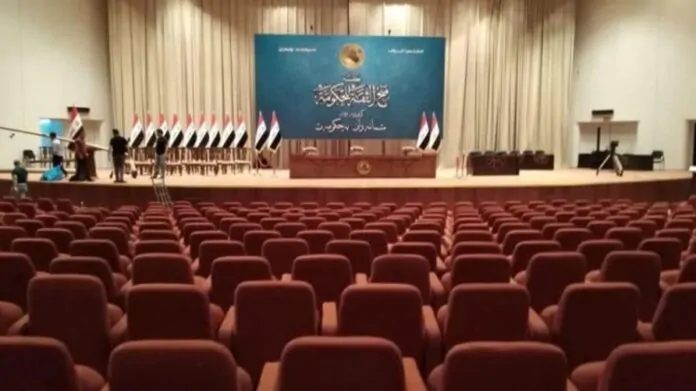The Ishraqat Kanun bloc revealed “partially” when it spoke about the MPs not being informed of the tables that were intended to raise the salaries of the MPs, and this matter was secret, while no information or clarifications were issued after that about the story, according to Al-Sumaria Channel. The news of the “secret procedures” that took place inside the Iraqi parliament in the session of Wednesday last week, August 7, related to adding “privileges and raising the salaries of members of the
The Parliament Presidency’s proposal for this came in conjunction with and “exploitation” of the first reading of the amendment to the House of Representatives Law, which was included for reading and amendment based on a decision by the Federal Court declaring the unconstitutionality of some phrases in Articles 48 and 50 related to the House of Representatives’ appointment of advisors. This was based on what was read during the session and the context of the session.
However, the legislature went even further by modifying a number of articles in the House of Representatives Law, including those pertaining to representatives’ privileges. These amendments also included the addition of personal guards for representatives—not just for the Speaker of Parliament and his two deputies—as well as the assignment of these guards to the representative even after his or her term as a representative has ended.
In addition, on the basis of Article 64 of the House of Representatives Law, the Speaker of Parliament and his two deputies are permitted to issue instructions for allocating their salaries and the salaries of Council deputies and employees. This means that they are not subject to a single law but rather to instructions for setting the necessary figures for salaries.
As the Federal Court issued a decision based on a lawsuit filed by one of the representatives, which led to reducing the salaries of the general managers in the House of Representatives in their capacity as employees, and their salaries were not reduced or the decision to reduce their salaries issued since 2017 in the Abadi government was not implemented, this amendment and move generally coincided with a response to a decision that was issued separately from the decision of the unconstitutionality of Articles 48 and 50 of the House of Representatives Law. This
According to the Federal Supreme Court’s decision, the reduction even included the salaries of House of Representatives members with a preparatory certificate and a bachelor’s degree. The salaries of members with a master’s degree remained the same or slightly increased, and the salaries of members with a doctorate were slightly increased.
The parliament presidency implemented paragraph 64 of the House of Representatives Law, which includes “issuing instructions on raising the salaries of representatives.” However, no details were revealed about the size of the increase in these salaries or how much they will amount to, as representatives have not yet seen any tables related to them. In general, the average salary of a representative decreased from 8 million and 200 thousand dinars to approximately 6 million dinars.
However, the majority of council members now receive salaries ranging from 8 to 10 million dinars, compared to 10 to 15 million dinars for representatives before the reduction to 6 million dinars. This widens the gap between parliamentarians’ salaries, which could range anywhere from 6 to 10 million dinars.





